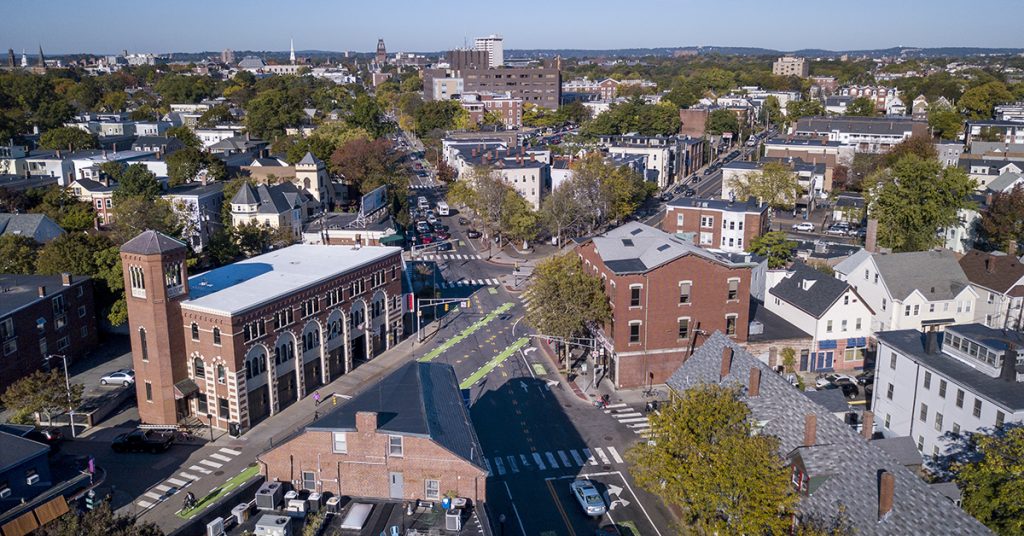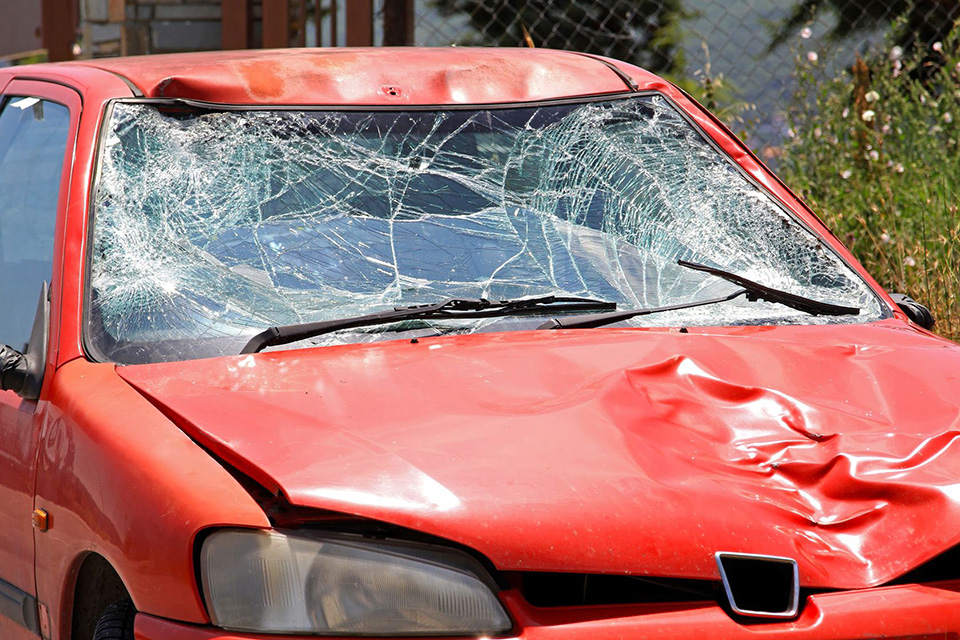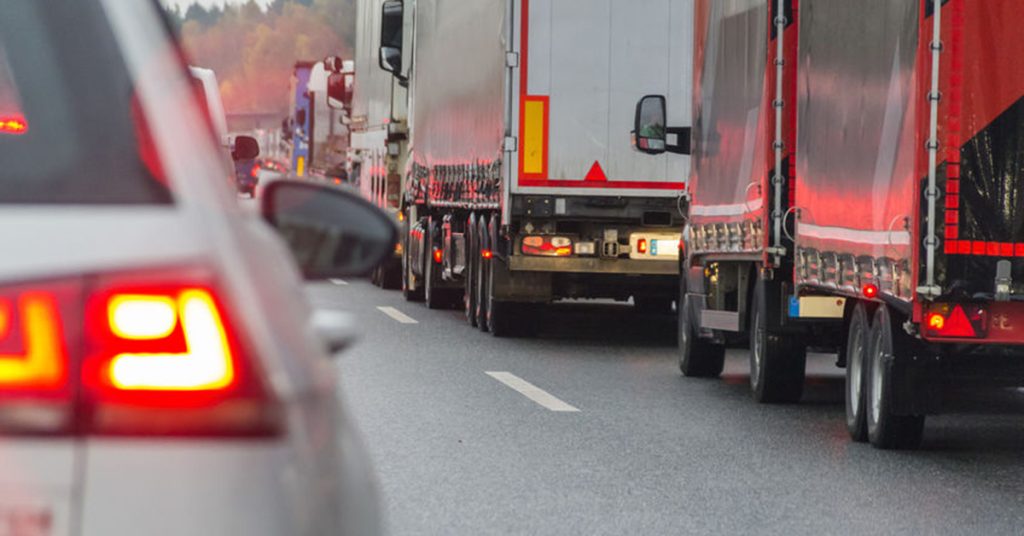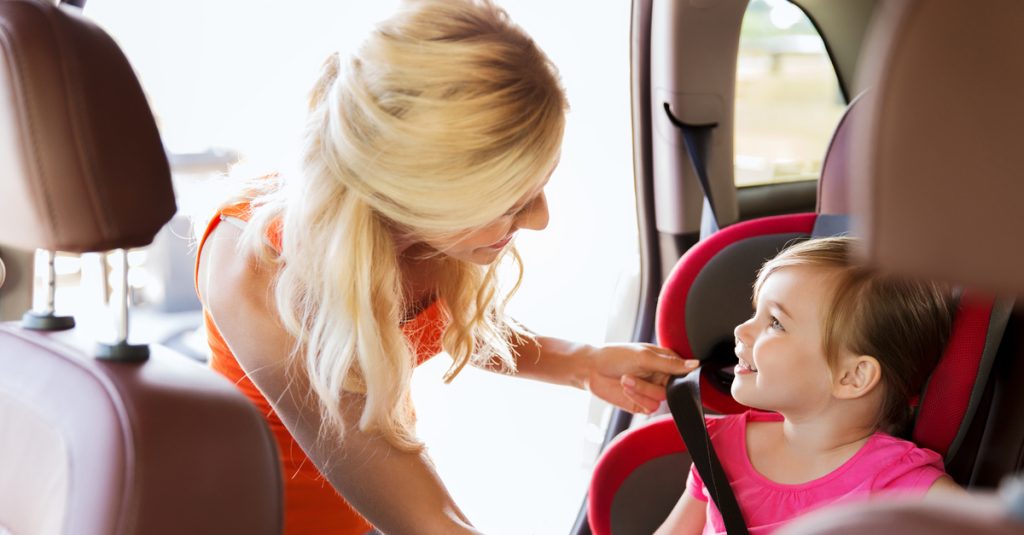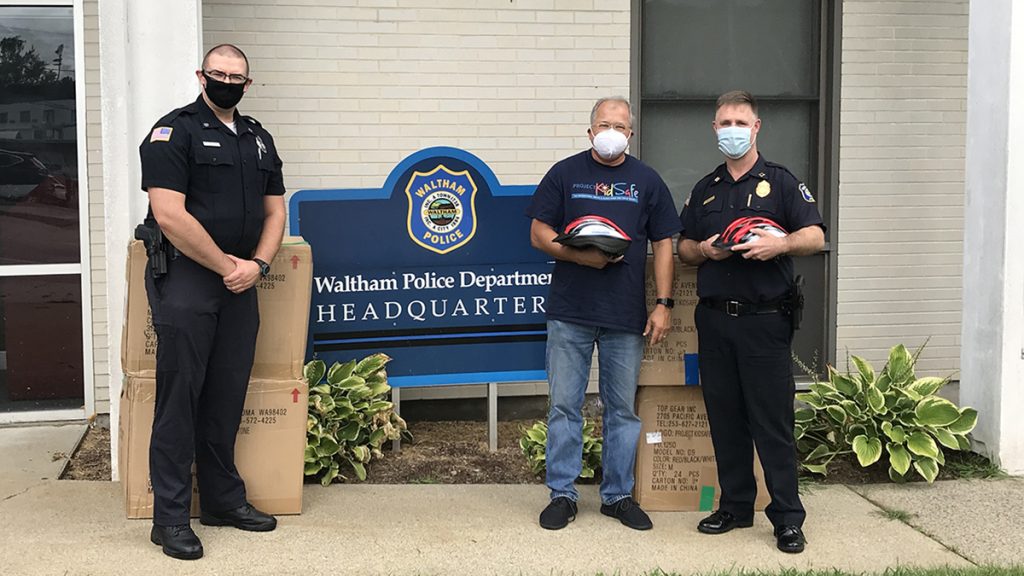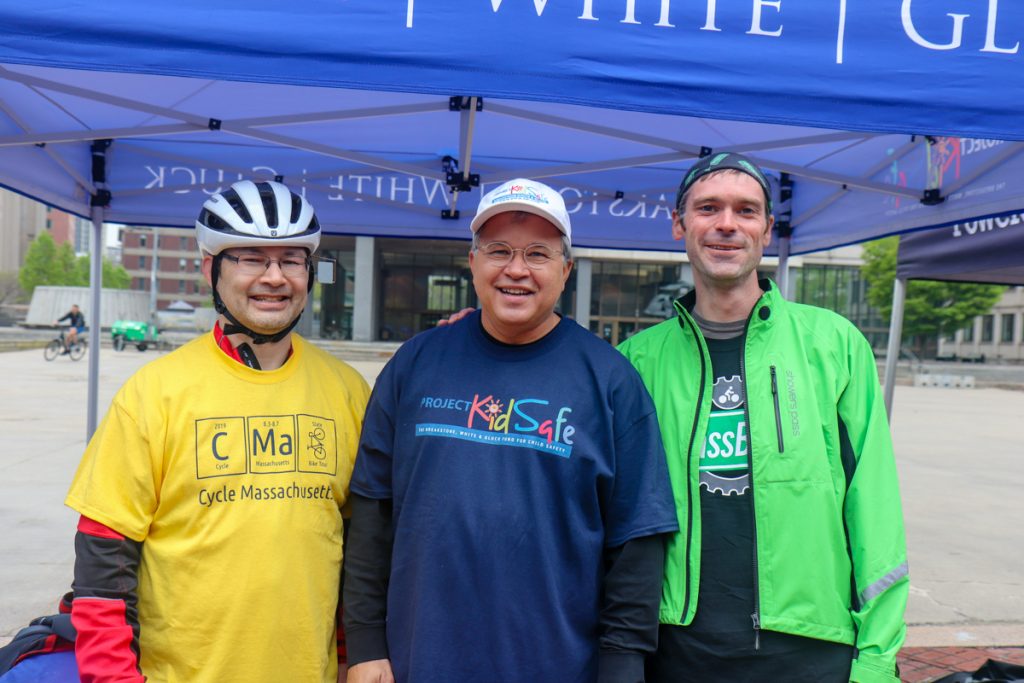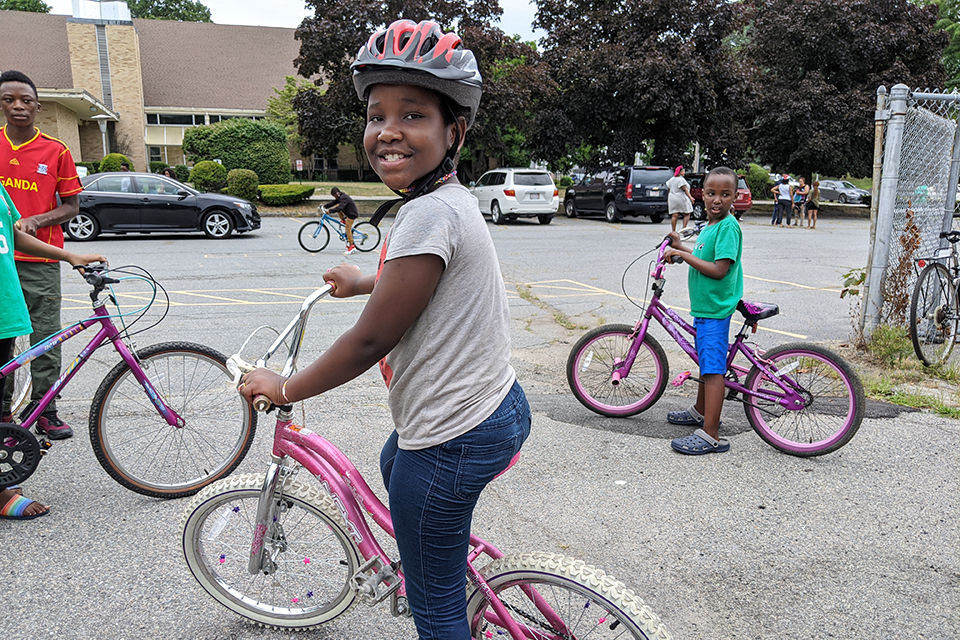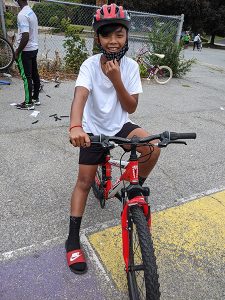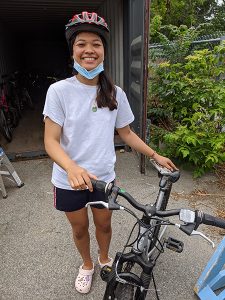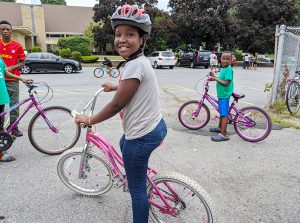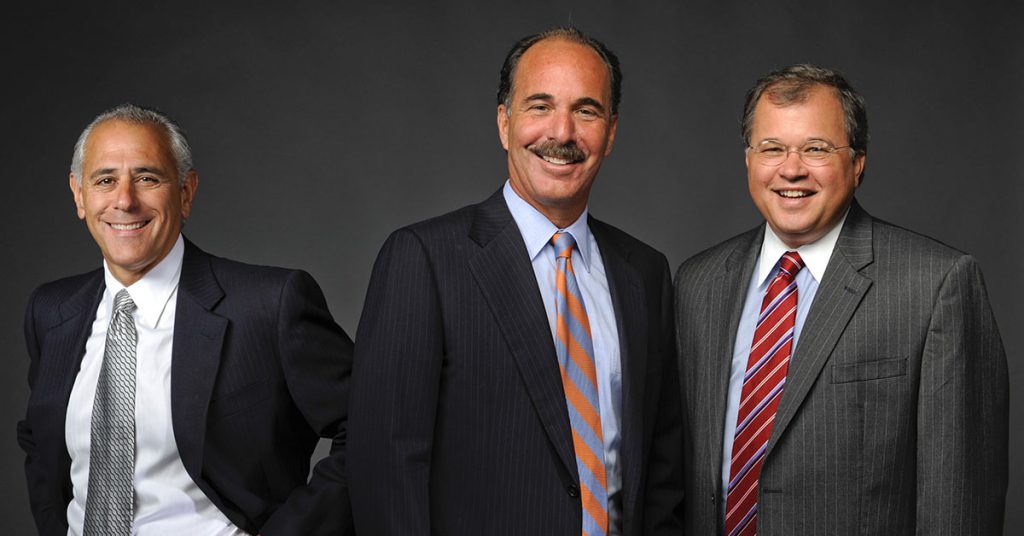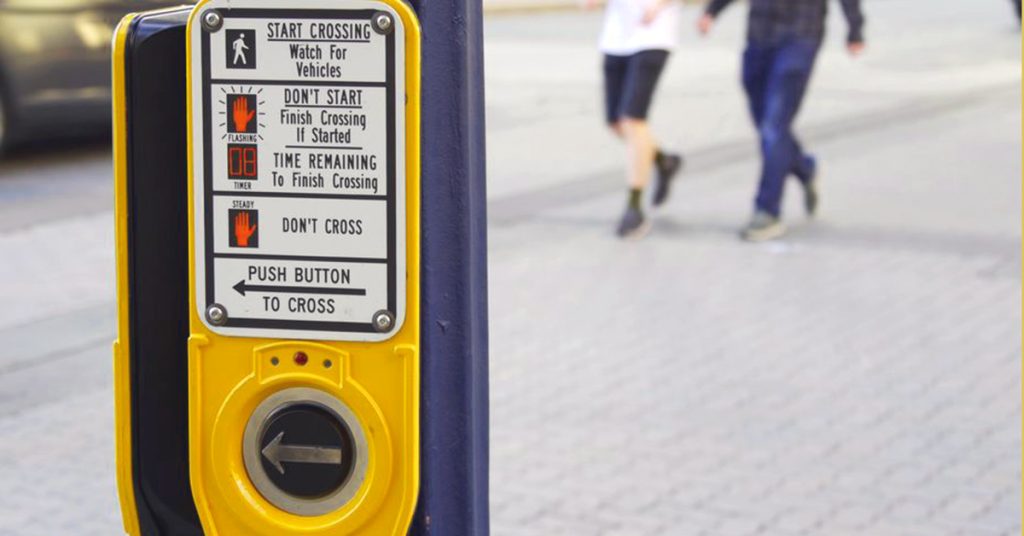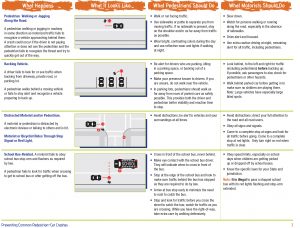Posts by Breakstone, White & Gluck
After Fatal Harvard Square Bicycle Accident, Cambridge Expands and Accelerates Plans for Protected Bike Lane Network
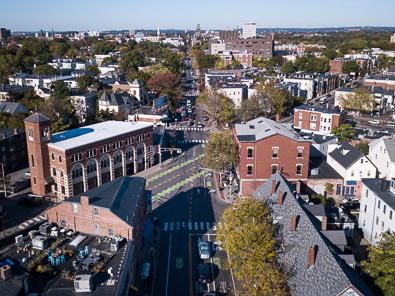
View from Inman Square, Cambridge, once ranked the top bike crash site in Massachusetts, according to MassDOT crash data. Photo: 2017, after installation of new bike lanes.
With strong encouragement from local cyclists, the Cambridge City Council voted to expand and update the Cambridge Cycling Safety Ordinance this week. The council approved the original ordinance last year, drawing national attention with an ambitious commitment to build 20 miles of protected bike lanes.
But cyclists felt there was more work to do. They recently asked the Cambridge City Council to prioritize areas for protected bike lane development, add new roads and establish a deadline for improvements.
- The Cambridge City Council approved a May 1, 2026 deadline for building out Cambridge’s network of protected bike lanes (now 22.6 miles), using either permanent construction or quick-build approaches (Source: Cambridge Bicycle Safety announcement dated October 6, 2020).
- Protected bike lanes will also be added in more areas, including Broadway, between Harvard University and Kendall Square, and Garden Street, according to according to StreetsBlog Mass.
- City councilors also voted to prioritize bike lane development in the area north of Harvard Square, directing city staff to develop a detailed plan by May 2021. Hampshire and Cambridge streets, near Inman Square, will also now move up on the work list (Source: StreetsBlog Mass).
The vote comes several weeks after a cyclist was killed in Harvard Square. In August, a large tractor-trailer struck and killed the male cyclist on Massachusetts Avenue, near Brattle Street. Just a year ago, in September 2019, another bicycle accident resulted in a female cyclist’s death in the area. A devastated family member later wrote a guest column in a local newspaper, urging the city to make safety improvements in Harvard Square.
The City of Cambridge has been studying traffic in congested Harvard Square. After the cyclist’s death in August, a city official stated Cambridge will add a separated bike lane and reduce travel lanes on Massachusetts Avenue, between the Harvard Square Kiosk and Harvard Square (Source: The Boston Herald, August 26, 2020).
Harvard Square is known for historic buildings and iconic shops, such as The Coop, the Harvard University bookstore. Adjacent to Harvard Yard and Harvard University, the square is located at the intersection of Massachusetts Avenue, Brattle Street and John F. Kennedy Street. The MBTA red line stops there and pedestrians and cyclists are in close proximity to motor vehicle traffic, buses and trucks.
Other Cambridge Bicycle Accidents
The Cambridge Bicycle Safety, a volunteer group, has led the effort for expanding protected bike lanes across the city. Its announcement noted this was the first mandatory timeline for building a bike lane network in the United States.
Safety is a leading concern for cyclists in Cambridge. Between residents and commuters, Cambridge has a high number of cyclists. When cyclists have been injured or killed in traffic accidents, many people have felt the impact. There has been a strong response in each case.
In June 2016, a 27-year-old cyclist was tragically hit and killed in a bicycle crash in Inman Square. The woman was struck by a Jeep Cherokee’s open door, then pushed into the travel lane, where she was ultimately struck by a moving dump truck, according to Wicked Local Cambridge. She was pronounced dead a short time later at Massachusetts General Hospital.
Then, in October 2016, a cyclist was fatally injured in Porter Square. The cyclist was struck by a tractor-trailer and a sedan during a morning ride. He was pronounced dead at the scene.
After these crashes, a Cambridge resident campaigned to encourage drivers to use the Dutch Reach method before exiting their vehicles. This method encourages drivers to take a full look at the road from their seat, so they do not risk “dooring” a cyclist.
As a result of his campaign, the state of Massachusetts added instruction on the Dutch Reach method to the state driver’s manual to educate drivers.
Free Legal Consultation – Boston and Cambridge Bicycle Accident Lawyers
Breakstone, White & Gluck is a Boston law firm which specializes in the representation of cyclists who have been injured by negligent drivers. Our attorneys offer more than 100 years combined experience handling all types of bicycle accidents, including truck crashes injuring cyclists, intersection bike accidents, right hook crashes and dooring. We help cyclists obtain compensation for recovery, including for medical care, lost wages and pain and suffering.
But our attorneys do more than represent cyclists. We are committed to improving safety for cyclists in the Boston area. We have long supported local cyclist clubs. And through our Project KidSafe campaign, we have donated 30,000 bicycle helmets to children across Massachusetts, including in partnership with the Cambridge Police Department. The League of American Bicyclists has honored us as a Silver-Level Bicycle Friendly Business.
If you have been injured, learn your legal rights. For a free legal consultation, call our Boston bicycle accident lawyers at 800-379-1244 or 617-723-7676. You can also use our contact form.
Massachusetts, Other States Continue to Report Light Traffic, But Dangerous Speeds During COVID-19
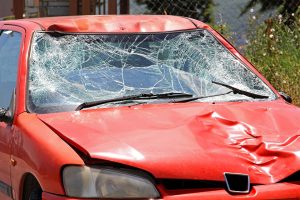 As employees work from home and schools offer remote learning, traffic volumes remain low across Massachusetts. This may mean less stressful driving at times. Yet it can also lead to an increased risk of car accidents caused by speeding.
As employees work from home and schools offer remote learning, traffic volumes remain low across Massachusetts. This may mean less stressful driving at times. Yet it can also lead to an increased risk of car accidents caused by speeding.
Across Massachusetts, traffic volumes are 20 percent lower than last year at this time, according to a MassDOT presentation this month. In some areas, traffic is even lighter. For instance, in the City of Boston, traffic is down as much as 48 percent.
North of Boston, there is an 18 percent decrease in traffic right now, according to the presentation. South of Boston, there is a 19 percent drop in MassDOT District 5, which includes Plymouth County, Bristol County and the Cape and Island. West of Boston, the decreases range from 28 percent to 18 percent.
If you commute, a MassDOT official said there is no peak traffic hour right now. This is true during both the morning and the afternoon/evening commutes. There is a consistent bump in traffic during these times, but nothing near pre-COVID 19 traffic levels.
An easier drive into Boston would be welcome news if not for COVID-19.
Boston is known for traffic gridlock. Many publications and websites have ranked the city’s driving experience among the worst in the U.S. Most recently, we earned a new honor, when WalletHub ranked Boston the 83rd worst of 100 driving cities.
According to the survey, Boston drivers log the most hours sitting in traffic congestion each year, along with drivers in New York City, Chicago, Philadelphia and Washington D.C. The rankings also noted Boston drivers are more likely to have a car accident than those in other cities.
Boston was ranked among the top 5 cities where drivers were most likely to have a traffic crash. This list also included the California cities of Oakland and Los Angeles, Washington D.C. and Baltimore, Maryland.
Speeding Accidents
Right now, there are fewer cars on the road. This may sound safer.
But NECN recently reported on the dangerous trend of drivers speeding into open roads. In Iowa, the state patrol recorded a 101 percent increase in drivers speeding 100+ mph from January through August. There was also a 75 percent increase in tickets for drivers who were traveling 25 mph or more over the speed limit.
In California, the highway patrol issued more than 15,000 tickets from mid-March through August 19 for speeding over 100 mph. This was a 100 percent increase over the same period in 2019.
Then, there is Ohio. Between April and September, state troopers issued 2,200 tickets to drivers traveling more than 100 mph between April and September. This marked a 61 percent increase from the same time last year. The highest speed was a stunning 147 mph.
Speeding can cause serious and fatal injuries, even when traffic is light. In April, there were 28 deaths, compared to 27 in April 2019 – despite half the traffic.
Like other states, Massachusetts has seen an alarming number of drivers cited for speeding. In March and April alone, Massachusetts police issued 15,071 speeding citations, including 259 drivers traveling at 100 miles or more, according to a Boston Herald report.
Police cited 1,035 drivers for traveling speeds of 90 mph to 100 mph. Another 2,518 were traveling between 80 and 90 mph.
Some of the fastest drivers were traveling even faster, at unbelievable and unsafe speeds. In Stoughton, a driver was caught traveling 140 mph in a 65 mph zone. Two other drivers reached 130 mph speeds in Ludlow and North Attleboro. On Cape Cod, a driver was caught traveling 125 mph.
Speeding is highly dangerous. MGL c.90, § 17 states, “No person operating a motor vehicle on any way shall run it at a rate of speed greater than is reasonable and proper, having regard to traffic and the use of the way and the safety of the public.”
Drivers have a duty to use reasonable care in Massachusetts. This means traveling the speed limit or slower when necessary for safety, even when there is no sign posted. In Massachusetts, cities and towns have a default speed limit of 30 mph in thickly settled or business districts. In 2016, the state passed the Municipal Modernization Act allowing communities to lower default speed limits to 25 mph. Many communities have done so and enjoy the improvements. Near schools and work zones, the speed limit is 20 mph.
Free Legal Consultation – Boston Car Crash Attorneys
If you have been injured, it is in your best interest to consult an experienced car accident lawyer. Since 1992, Breakstone, White & Gluck has represented those injured by negligent driving across Massachusetts, including in Boston, Cambridge, Quincy and the South Shore, the North Shore, Plymouth, Brockton and Cape Cod.
For a free legal consultation, contact our attorneys at 800-379-1244 or 617-723-7676 or use our contact form.
Chilling Reports of Multi-Vehicle Crashes on Massachusetts Highways
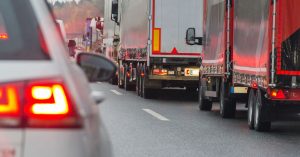
Recently, there have been several serious multi-vehicle highway accidents in the Boston area.
Many drivers have chosen backroads for the past few months. Now, as more people are driving again, we want to caution you to drive safely on Massachusetts highways. Recently, there have been some serious highway crashes, including multi-vehicle crashes.
Our safety tips for traveling on local highways:
Stay in your lane. Unless you have to move, staying in your lane is easier for you and more predictable to other drivers. You are also less vulnerable if another driver speeds up behind you suddenly.
Follow the speed limit. Always watch for the posted speeds. Expect to travel 65 mph on major highways and 55 mph on others. But remember you have a duty to use reasonable care. Driving safely may mean you have to slow down due to weather or traffic conditions to protect yourself and other drivers. You may also have to slow down if you approach a crash scene.
Make safe decisions. When you make bad decisions, you increase your chances of causing a car accident. Two very unsafe decisions are drinking and driving and speeding. On a highway, your dangerous decision is likely to cause far more injuries because of the traffic count and high speed. Think about a game of dominoes, without the game part.
Protect yourself near trucks. Try to avoid traveling right near or behind large trucks. If you must, provide them with ample room to avoid a crash.
Be aware that trucks create wind gusts. Keep both hands on the steering wheel and stay focused on the road.
Back off when a truck driver signals a lane change. On highways, the average truck needs an 8-second gap or 700 feet to change lanes, according to the AAA Foundation for Traffic Safety. This is the length of 2 ½ football fields.
Give emergency vehicles room to work. In Massachusetts, the Move Over Law establishes that drivers have duty to move out of the way of emergency responders and vehicles with flashing lights. You can be fined $100 if you violate this law. You are also likely to be held financially liable if you cause someone injury or property damage to a motor vehicle or a highway fixture, such as a sign or a guardrail.
Do not use cell phones on highways. Distraction and high speeds are not a safe combination. Avoid cell phone use on highways – or at least go hands-free. Picking up your cell phone to call someone and texting while driving are against the law in Massachusetts.
Recent Highway Accidents in Massachusetts
3-Car Crash Kills Young Girl on Route 6 in Westport. Two drivers collided on Route 6 in Westport on the morning of Sunday, Sept. 13. After assessing the damage, they decided to keep driving and to address the situation after clearing the highway. But as the cars started to move, a Jeep Grand Cherokee slammed into the vehicles, one of which was carrying a 10-year-old girl who was killed and her 9-year-old sister, who suffered serious injuries.
7-Vehicle Crash on I-93 in Dorchester. In late August, news outlets reported a tragic multiple car crash on I-93 in Dorchester, just after 7:30 p.m. According to the Cape Cod Times, a 39-year-old female driver hit a highway barrier and an ambulance, then died from her injuries. She was not the only victim. The crash involved a total of 7 vehicles and several people were transported to receive medical care.
Wrong Way Crash Kills 2 in Brockton. Meanwhile in Brockton, a 30-year-old driver allegedly drove in the wrong direction at 3 a.m. Her Volkswagen Jetta struck a Hyandai Santa Fe, colliding and killing two people inside The Brockton car crash occurred on the Reynolds Memorial Highway and as of August 23, was under investigating by the Plymouth County District Attorney’s office and the Brockton Police. A third driver in a Chevy Tahoe was involved in the crash, but refused medical treatment (Source: NBC Boston).
Littleton Truck Crash on Route 2. In July, there was a very serious crash involving a tractor-trailer and two pick-up trucks on Route 2 in Littleton. Surprisingly, no one was injured in the multi-truck crash. However, emergency crews had to close down the eastbound side of the highway to recover the vehicles.
According to WHDH, emergency responders found the tractor-trailer and one of the pick-up trucks off the road on the guard rail. The other pick-up truck was overturned. Police were investigating the cause of the truck crash, according to WCVB-TV.
Free Legal Consultation – Boston Car Accident Lawyer
If you have been injured by someone’s negligent driving in Massachusetts, contact the lawyers of Breakstone, White & Gluck in Boston to learn your legal rights. If you have been injured in a multi-car highway crash, this is even more important. Highway crashes may involve several drivers and business vehicles or a large truck. The insurance claim process is complex for the individual drivers and passengers involved. As they attempt to find their way, the companies can mobilize quickly to defend their financial interests. It is vital that you act immediately to protect your rights.
Contact our Boston car accident attorneys for a free legal consultation: 800-379-1244 or 617-723-7676 or use our contact form.
For Massachusetts Parents, Resources from Child Passenger Safety Week
 While there is so much going on right now, we want to put a spotlight on Child Passenger Safety Week. The safety week began Sunday, Sept. 20th and continues through Saturday, Sept. 26th.
While there is so much going on right now, we want to put a spotlight on Child Passenger Safety Week. The safety week began Sunday, Sept. 20th and continues through Saturday, Sept. 26th.
Motor vehicle accidents are the leading cause of death among children in our country, according to the CDC. Parents, of course, want to protect their children and follow Massachusetts car seat and safety belt laws. But this can be a challenge as children outgrow car seats, especially during COVID-19, when most shopping has to be done online.
We hope parents and grandparents find the resources on this page helpful. Remember, you want to find a car seat that fits your child and your vehicle. You also want to feel comfortable using it each day. A second-hand car seat may work for you. But for many people, we encourage to you start with a new car seat if you can.
In Massachusetts, children must ride in federally-approved passenger safety seats. They must ride in a car seat from birth until they reach age 8 or stand more than 57 inches tall. Children must be properly fastened and secured according to the manufacturer’s instructions. But where should you start? This is where parents often grow frustrated, as there are different car seats based on a child’s age and size. We will get you started: Children should start with rear-facing car seats until they reach the top height or weight limit set by the car seat maker. They will then move to a forward-facing car seat, then finally a booster seat.
Here are some resources:
- Child Passenger Safety Week. Read safety resources from the National Highway Traffic Safety Administration.
- Find the Right Car Seat. Check out this NHTSA chart on finding the right car seat.
- Massachusetts Car Seat Resources. Most years, the state of Massachusetts and local communities offer free car seat inspections and fittings for parents. This is an invaluable opportunity for parents. Due to COVID-19, you can expect fewer – if any – in-person car seat inspection opportunities. We suggest you start by visiting the state web page. Here is another helpful resource: Massachusetts Car Seat FAQs.
- Watch a How-To Video. While it may not be the same as an in-person inspection, the NHTSA offers helpful videos to help parents secure children at different stages.
- Keeping Asking for Help. If you are still unsure about your car seat, it is alright to keep asking for help. Try asking a family member or friend. You can also try your pediatrician’s office or visit your local police department’s website to see if they are offering car seat inspections at this time.
- Check Your Car Seat for Recalls. Check www.cpsc.gov to see if your car seat has been recalled. If you find a recall, call the manufacturer immediately and ask for the recall action. Often, a company will send a replacement part. But they may issue you a refund and ask you to return a defective car seat to a local store. Always follow a manufacturer’s instructions on disposing a recalled product.
- Register Your Car Seat. It’s easy to become distracted when you buy a car seat or a major item. Did you forgot to register yours? Take a minute to visit the manufacturer’s website now. Better late than never on this one. If there is a recall, this is the best way to get timely notification.
- Buckle Children Up Last. Pack everything up for the day in your car – work bags, backpacks, sports gear and lunch boxes – then buckle your child into their car seat last. This way you can always keep them in sight and talk to them as you get ready.
About Breakstone, White & Gluck – Boston Car Accident Lawyers
With more than 100 years combined experience, Breakstone, White & Gluck represents those have been injured by negligence and wrongdoing in Massachusetts. We specialize in the handling of personal injury, medical malpractice and car accident cases, including the representation of cyclists and pedestrians who have been injured. To learn more about our work, read our Car Accident Case Results page.
For a free legal consultation, contact our lawyers at 800-379-1244 or 617-723-7676 or use our contact form.
Safety Reminders for College Students and Others Renting Apartments in Boston

College students and other renters have the right to live in safe apartments.
September has arrived. In Boston, college students returned a few weeks ago and the focus has been preventing the spread of COVID-19. But apartment safety is another important topic – for college students as well as other renters.
If you rent an apartment, your safety is paramount, and that has not changed during COVID-19. We encourage you to inspect properties before signing leases and moving in. Speak to your landlord, your college or your family if you find yourself in unsafe conditions.
At Breakstone, White & Gluck, our personal injury lawyers are experienced in cases involving landlord negligence resulting in the injury of our clients. In Allston and other parts of Boston, we have represented college students and other renters who have been very seriously injured in falls and fires. These are devastating stories, more so because landlords neglected their responsibilities to maintain safe premises.
During COVID-19, there is a very real risk that landlords may fall behind or neglect to maintain their properties. If you rent and see a hazard, be prepared to speak up so no one is injured.
We share a few safety tips and resources:
Notify Your Landlord of Hazards Promptly
If you see a hazard, notify your landlord or the property owner. We know it can be overwhelming to be 19 or 20 years old, living on your own for the first time and stressed about approaching a landlord. Honestly, this is never easy – even for renters with a few years of experience. But if you need help, you should reach out to your parents, family members or someone else you trust. Your safety – and the safety of your roommates and others in the building – is the priority.
When you contact your landlord, do so in writing. Describe what appears unsafe and email a photo. Ask them to come inspect the problem. If you do not make any progress, call your college or the City of Boston’s Inspectional Services Department.
Thoroughly Inspect Your Apartment Regularly
If you recently signed a lease, you likely inspected the apartment first. Your apartment may be in good condition and look well-maintained. But things can break. Safety hazards can emerge with use. Monitor conditions throughout the year so no one is injured.
If you are in the middle of a lease or have rented through COVID-19, you should also conduct a thorough inspection with a new eye.
You may see hazards you have learned to live with. A few examples include broken handles, railings and staircases. Collapsed wood on porches or decks, which will eventually rot away. Floors which are so worn you have already slipped on them. We will stop here. You cannot live with these things. Doing so could result in an accident – and will likely result in you losing part of your security deposit down the road. Alert your landlord now.
Never Forget the First Step of Safety: Smoke Alarms
Smoke alarms are the most basic tools you have to protect yourself. Make sure your apartment has working smoke alarms and carbon monoxide detectors at all times. Regularly replace the batteries and test them.
Check Out These Websites and Resources for Tenants
Know Your Rights When You Rent in Boston
City of Boston Inspectional Services
Attorney General’s Guide to Landlord and Tenant Rights
A Warning About Fake Apartment Listing Scams, WCVB-TV Boston
Injured by a Landlord’s Negligence in Massachusetts? – Free Legal Consultation
With more than 100 years combined experience, Breakstone, White & Gluck and our Boston personal injury lawyers fight for the rights of those injured by negligence and wrongdoing in premises liability cases. Our attorneys have been consistently recognized among the best lawyers in Massachusetts and New England by Super Lawyers and Best Lawyers in America. We provide experienced representation to those injured by the negligence of property owners and landlords, including in falls, porch collapses, fires and elevator accidents.
If you have been injured by unsafe conditions in an apartment, learn your legal rights. Call Breakstone, White & Gluck at 800-379-1244 or 617-723-7676 or use our contact form.
Six Years of Partnering with Waltham Police on Bike Safety
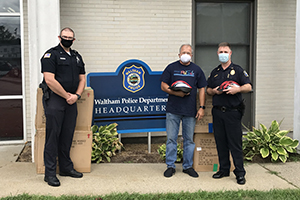 One of our longest-running partnerships through our Project KidSafe campaign is with the Waltham Police Department. For the 6th year, Breakstone, White & Gluck was pleased to donate 100 bike helmets for officers to distribute to children who need one. Attorney David W. White delivered bike helmets to Captain Jeff Rodley (far right) and Officer Chris Benson (far left) at the Waltham Police Department last week.
One of our longest-running partnerships through our Project KidSafe campaign is with the Waltham Police Department. For the 6th year, Breakstone, White & Gluck was pleased to donate 100 bike helmets for officers to distribute to children who need one. Attorney David W. White delivered bike helmets to Captain Jeff Rodley (far right) and Officer Chris Benson (far left) at the Waltham Police Department last week.
We are pleased to make the donation as Massachusetts schools begin to re-open. We know more children and families have been riding bikes since the COVID-19 closures last March. We also know there may be more children riding to school and it is critical that they protect themselves – every time they ride. Wearing a helmet makes good sense and is the law in Massachusetts for children 16 and younger.
Learn more about our Project KidSafe bike safety campaign. Breakstone, White & Gluck is a Boston personal injury law firm. To learn about our work and our attorneys, visit our website.
Cyclists, Massachusetts is Still Celebrating Bay State Bike Month
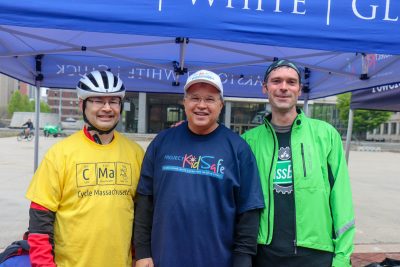
From 2019 Bike Month: Attorney David W. White (center) with Lee Toma (left) of Milton Bike and Galen Mook, executive director of MassBike.
Cyclists have something to look forward to this month. A long-time tradition will continue in Massachusetts: Bay State Bike Month. The schedule began on Sept. 1 and runs through the end of the month.
We encourage everyone who commutes to work to check out the schedule. Breakstone, White & Gluck usually participates in Bike Month activities in the Boston area and we have a lot of fun. We donate bicycle helmets to various events as part of our Project KidSafe campaign. Last year, Attorney David W. White was fitting helmets for commuters at Boston’s Bike to Work Festival at City Hall Plaza.
This is always a worthwhile opportunity to connect with other cyclists and learn about safe riding techniques. But we give cyclists a little more of a nudge this year, after so many of us have been isolated due to COVID-19.
Now in its 26th year, Bay State Bike Month is organized by MassBike, MassCommute and the Massachusetts Coalition of Transportation Management Associations. The goal is to promote cycling for commuting, fitness and recreation, and also introduce the activity to new riders. This year, the event was postponed from May to September due to COVID-19.
The schedule is lighter this year, but small and online events are being added daily. The signature event, MassCommute Bicycle Challenge, will still be held – though virtually – from Sept. 19 to 27. Get ready to log your miles.
While fewer cyclists may physically gather at events, we know many are interested in cycling and concerned about the risk for accidents. That’s why we want to share this video, “Safer Trucking in Changing Cities,” which was recently shared in the Somerville Bicycle Committee’s monthly newsletter. The video was funded by the Joe Lavins Fund for Bicycle Safety.
We encourage anyone interested in cycling on the road to watch this video and hear from local cyclists and safety advocates. They expertly describe safety conditions for cyclists in the Boston area and explain how truck drivers can reduce the risk for bicycle accidents. One topic was infrastructure. If you are new to cycling, it may be valuable to hear the cyclists explain some of the safety infrastructure cities have built in recent years. The cyclists explained how bike lanes, separated bike lanes and bike boxes at the top of intersections can protect cyclists – if truck drivers take the time to learn their responsibilities and give cyclists adequate space in these areas.
[vimeo 307147180 w=640 h=360]
SAFER TRUCKING in Changing Cities from FOV videos on Vimeo.
About Breakstone, White & Gluck – Boston Personal Injury Attorneys
Breakstone, White & Gluck is an award-winning Boston law firm which specializes in personal injury law. With more than 100 years combined experience, our firm has represented drivers, passengers, cyclists and pedestrians injured by negligent driving in Massachusetts.
We have made a special commitment to bicycle safety in Massachusetts. Each year, we donate bicycle helmets to children as part of our Project KidSafe campaign, working in partnership with local police departments, bicycle committees and Massachusetts Safe Routes to School.
We proudly support MassBike as a business member. Our attorneys also work with MassBike to distribute our bicycle helmets as part of our Project KidSafe campaign.
Breakstone, White & Gluck Gives Bike Helmets in Lowell This Summer
- The Bike Connector donated refurbished bikes in Lowell. Breakstone, White & Gluck supported the donations by giving each cyclist a free helmet from our Project KidSafe campaign.
- The Bike Connector donated refurbished bikes in Lowell. Breakstone, White & Gluck supported the donations by giving each cyclist a free helmet from our Project KidSafe campaign.
- The Bike Connector donated refurbished bikes in Lowell. Breakstone, White & Gluck supported the donations by giving each cyclist a free helmet from our Project KidSafe campaign.
We are pleased to share an update from Lowell, where our partner, The Bike Connector, had a strong start-up year getting bikes and safety materials to students, despite the many challenges of COVID-19. We hope interest and momentum is building around The Bike Connector’s work.
As of mid-August, The Bike Connector had distributed 93 new refurbished bikes to local students (which is a big accomplishment, even in non-COVID times). Breakstone, White & Gluck was pleased to support the organization’s bike safety initiative. Our attorneys gave each student a new bicycle helmet, as part of our Project KidSafe campaign.
The Bike Connector had to relocate from its classroom due to COVID-19. It ended up working out of a storage container at Career Academy in Lowell Highlands, which is part of the Lowell Public School system. But the organization made the set-up work. They even enjoyed a few benefits, such as being able to work with students outside, having bikes and safety gear nearby and shade from the hot sun.
The organization identified youth who needed bikes by partnering with the Lowell Public Schools and other educational, non-profit and social services agencies across the city. These organizations included Brigid’s Crossing; Merrimack Valley Catholic Charities and the Cambodian Mutual Assistance Association. Other partners: the Boys and Girls Club of Greater Lowell; UMass Lowell Freewheelers; Elevate New England; and New American Center.
If you were in Lowell this summer, you may have seen The Bike Connector giving away refurbished bikes and helmets. You may have seen the students and their families having a lot of fun as they received new bikes. If you looked closer, the excitement extended beyond students and their families. Word of events spread quickly in neighborhoods.
Behind the scenes, what you didn’t see was The Bike Connector also offered a four-week online summer bike academy to incoming freshmen at Lowell High School this summer. This program introduced students to bike safety, bike maintenance, the rules of the road, Lowell geography and urban planning. Each student who participated earned a bike, helmet and light. We hope this course proves to be a guide as students return to school and want to travel safely on bikes.
About Breakstone, White & Gluck – Boston Personal Injury Lawyers
Breakstone, White & Gluck is a Boston personal injury law firm which represents clients who have been seriously injured by negligence or wrongdoing. In 2013, our lawyers founded our Project KidSafe campaign, with a goal of encouraging children to wear helmets every time they ride. By wearing a properly-fitted helmet, children and other cyclists can protect against head injuries. In Massachusetts, children age 16 and younger are required to wear helmets. But children need more. They need a strong encouragement from their families and others in the community. If you are a parent, we encourage you to wear a helmet along with your child.
Learn more about Breakstone, White & Gluck and our Project KidSafe campaign.
Court Gives BUSINESS INTERRUPTION Claims a Chance – Here’s What You Need to DO
Pandemic-related closures have ravaged small businesses. Many thought they could rely on insurance to step in and cover losses, but that hasn’t been the case. Businesses have been denied lost income coverage almost uniformly. Small business owners have felt helpless.
A federal court in Missouri, however, has breathed life into the possibility of coverage for small business owners. (Read about the details of the case below.) Here’s what this means for you:
- If you are small business owner, contact your agent or broker;
- Request a copy of your full policy;
- If you haven’t made a claim with your insurance company, do not do so until you speak with a lawyer;
- If you have made a claim and been denied, collect all correspondence from the insurance company, along with your policy.
- Contact the attorneys at Breakstone, White & Gluck for a free case evaluation. Know your rights and options on how to proceed.
Act promptly so your rights will be preserved!
Business Interruption Claims Score Victory
In an important victory for business owners, a federal court in Missouri permitted the claims of five businesses (restaurants and hair salons) to go forward against their insurance company for business interruption losses due to the COVID-19 pandemic.
On August 12, 2020, the United States District Court in Studio 417, Inc. v. Cincinnati Ins. Co., No. 20-cv-03127-SRB, slip op. (W.D. Mo., Aug. 12, 2020) denied defendant’s motion to dismiss plaintiffs’ first amended class action complaint. The complaint sought to cover losses by small business owners from The Cincinnati Insurance Company for business interruption due to the COVID-19 pandemic. All five plaintiffs sought coverage under their “all-risk” property insurance policies.
The All-Risk Policies
All-risk policies cover all losses except for those specifically excluded. The court noted that all plaintiffs had business income coverage during the applicable time period, which contained the same relevant language.
The plaintiffs’ policies did not include any exclusions for losses caused by viruses or communicable diseases. The policies agreed to cover business income losses sustained “due to the necessary ‘suspension’ of [ ] ‘operations’ during the ‘period of restoration.’”
Further, the policies included coverage for “Civil Authority” decisions; meaning losses incurred “by action of civil authority” that prohibits access to the businesses or surrounding areas.
The policies also included coverage for losses sustained due to dependence on others to deliver materials or services. Each policy required all business to take reasonable steps to protect their business from further damage and to record the losses incurred. Again, the policies did not exclude or limit losses from viruses, pandemics, or communicable diseases.
The Business Owners’ Claims
The business owners articulated the cause of their losses in various ways: that it was likely that a person with COVID-19 visited their premises and infected the property with the virus; that the virus lives on property and is emitted into the air; that the virus rendered their property unsafe and unusable; and that they were forced to suspend or reduce their business.
Furthermore, the virus caused the civil authorities in Missouri and Kansas to order suspensions of business, including the plaintiffs’ businesses, which required the plaintiffs to cease or significantly reduce their operations. Together, the virus and closure orders denied use of the property and damaged the property. Under the various provisions of the business income coverage, the plaintiffs argued they were entitled to be made whole for their losses. Defendant denied their claims.
The Insurance Company’s Denial Explained
The defendant insurance company argued that plaintiffs did not suffer a “physical loss” as required by the policies. In other words, there was no “actual, tangible, permanent, physical alteration of property,” such as in a fire or storm. In this conception, COVID-19 did not damage the plaintiffs’ property. The virus hurts people, defendant argued. Absent physical damage, coverage was rightfully denied.
The Court’s Decision
The case was before the court on defendant’s motion to dismiss the plaintiffs’ claims. Plaintiffs argued the case should not be dismissed; because although defendant’s interpretation of the policy language may be reasonable, so is plaintiffs. Therefore, the court should not dispose of the case before it starts and let it proceed.
The court noted that plaintiffs agreed “physical loss” is a key phrase in the policies, but noted that the policies provided coverage for “physical loss or physical damage.” The court, examining the policy language, stated that “loss” or “damage” was the first requirement for coverage. But given that both phrases were included, “loss” must be distinct from “damage,” the court reasoned. Plaintiffs’ argument that defendant’s focused only on “damage” or physical alteration and ignored “loss” was persuasive. The court acknowledged plaintiffs’ argument that the policies could have defined “loss” and “damage” but did not. As such, the court looked to the plain language of loss and defined it by the dictionary definition as “the act of losing possession” and “deprivation.”
Ultimately, the court agreed with plaintiffs. It held that COVID-19 did present some direct physical loss given that COVID-19 particles attached to and damaged the respective properties. Where the properties became uninhabitable or unusable for their intended purpose, the owners suffered a loss. Because plaintiffs could also not receive materials and services from dependent businesses, plaintiffs suffered a loss. This was enough, according to the court, to survive a motion to dismiss.
Regarding the closure orders by civil authorities, the court held that it was sufficient for plaintiffs to allege that access was prohibited to such a degree as to trigger the civil authority coverage in the policies. Plaintiffs did not have to show that all access was denied. Or any access. Not at this stage. The direct physical loss, together with the closure orders by civil authorities, caused damage to the properties. Thus, the court held, the case should not be dismissed at this juncture.
Of note, the court concluded its opinion with a nod to other cases also being litigated construing similar insurance provisions. It conceded that those decisions may be persuasive on the court’s future opinion of the case.
Free Legal Consultation – Breakstone, White & Gluck
For a free legal consultation, contact Breakstone, White & Gluck at 800-379-1244 or 617-723-7676 or use our contact form.
Drivers Making Unsafe Turns Cause Many Pedestrian Accidents in Intersections
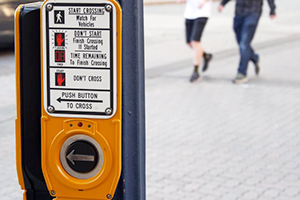 Many of us will head back to work and school in September and October, at least part time. Due to COVID-19 and our new schedules, some of us may choose to walk for the first time, instead of relying on public transportation. If you walk, use caution – especially in intersections.
Many of us will head back to work and school in September and October, at least part time. Due to COVID-19 and our new schedules, some of us may choose to walk for the first time, instead of relying on public transportation. If you walk, use caution – especially in intersections.
Nearly 20 percent of all traffic accidents result in pedestrian fatalities, according to the National Safety Council. An estimated 40 percent of all pedestrian accidents occur in intersections, according to the Federal Highway Administration (FHWA).
A few facts from a FHWA study on pedestrian accidents in intersections:
Drivers are making unsafe turns. According to this study, one in five pedestrian accidents at signalized intersections occurred when vehicles made unsafe turns.
Left-turning vehicles cause more pedestrian accidents at intersections. Pedestrians at signalized intersections are more likely to be hit by a left-turning vehicle. Researchers found 60 percent of drivers who hit pedestrians turned left, while 40 percent turned right. The FHWA researchers noted a driver’s view may be impeded more when turning left.
Pedestrians walk safer in groups. Researchers concluded that pedestrians walking in groups were less likely to be hit by left-turning vehicles than those walking alone. Again, this may be due to drivers being able to see pedestrians better. There was a notable difference – three out of four pedestrians hit by left-turning vehicles were walking alone.
Take Steps to Protect Yourself at Intersections
If you are a pedestrian, cars and trucks have the advantage in size. You have to assume drivers won’t always be able to see you as traffic moves. You also have to be prepared for negligent operators, who are speeding or allow themselves to become distracted.
You can take steps to protect yourself though. Purchasing a neon vest is a good place to start. If a driver can see you, they may be more likely to slow down. Also take advantage of technology. Use Google Maps or another traffic app to plan your walking route.
At intersections, look for crosswalks with pedestrian traffic signals. Wait for the walk signals before crossing. Drivers have a responsibility to yield the right of way to pedestrians in all marked crosswalks in Massachusetts. Yet pedestrian signals are more visible and can make a big difference in protecting pedestrians.
Drivers also have a responsibility to check for pedestrians (and cyclists) before turning at intersections. Studies have found that drivers are not looking enough – which is frustrating because more cars now have rearview mirror cameras to help them. Drivers need to be scanning the intersection more in front and behind for pedestrians and cyclists. This is critical in Boston, Cambridge and other cities because commercial truck drivers travel much higher up than pedestrians and cyclists and often, there is no eye contact. But truck drivers are not the only risk. Pedestrians have to be aware of all vehicles – SUVs, cars, buses. These drivers should also be paying attention to you.
Breakstone, White & Gluck – Boston and Cambridge Pedestrian Accident Lawyers
At Breakstone, White & Gluck, our Boston personal injury lawyers fight for justice for those who have been seriously injured by negligence or wrongdoing. With more than 100 years combined experience, our attorneys specialize in the representation of those injured in pedestrian accidents and bicycle crashes in Massachusetts. For a free legal consultation, call our attorneys today at 800-379-1244 or 617-723-7676 or use our contact form.


